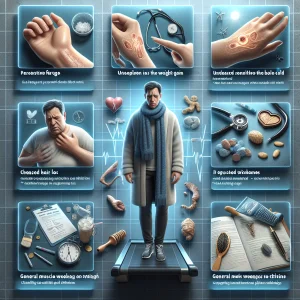Explore the Critical Health Risks of Hypothyroidism in Men for Better Management
Hypothyroidism in men is a significant health issue that arises when the thyroid gland, located at the front of your neck, fails to produce adequate amounts of essential thyroid hormones. The primary hormones involved are thyroxine (T4) and triiodothyronine (T3), both of which play vital roles in regulating numerous bodily functions. These functions encompass metabolism, energy levels, and overall vitality. While hypothyroidism can impact anyone, men may experience unique symptoms and challenges that can severely affect their quality of life. Therefore, developing an understanding of this condition is paramount for effective treatment and management.
Recognizing the specific characteristics of hypothyroidism is crucial to ensure effective treatment and management strategies are implemented. Men often overlook the signs of this condition due to their subtle presentation, frequently attributing them to stress, lifestyle changes, or the natural aging process. This common misconception can lead to ongoing discomfort, complications, and a noticeable decline in quality of life if not addressed in a timely manner. Consequently, early detection plays an essential role in achieving optimal health outcomes and maintaining a high standard of living.
The underlying causes of hypothyroidism are diverse and may include autoimmune disorders like Hashimoto’s thyroiditis, side effects from medications, or complications arising from radiation therapy. Early recognition and comprehension of symptoms are vital for timely intervention, which can significantly enhance overall health and improve one’s quality of life.
Key Facts About Hypothyroidism That Every Man Should Understand
- Hypothyroidism in men is indicative of inadequate production of thyroid hormones by the thyroid gland, leading to various physical and psychological health challenges.
- Physiological symptoms of hypothyroidism can manifest as persistent fatigue, unanticipated weight gain, thinning hair, and muscle weakness. Health risks can also include elevated cholesterol levels, an increased risk of heart disease, and a potential onset of diabetes.
- The emotional and psychological impacts of hypothyroidism in men can lead to depression, anxiety, and cognitive difficulties, significantly diminishing overall quality of life.
- This condition can adversely affect sexual health, causing reduced libido, erectile dysfunction, and potential fertility issues.
- Men suffering from hypothyroidism often struggle with weight management, as the condition slows metabolic rates, complicating weight loss efforts and necessitating personalized dietary and exercise plans.
 Recognizing the Physical Symptoms and Associated Health Risks of Hypothyroidism
Recognizing the Physical Symptoms and Associated Health Risks of Hypothyroidism
The physical symptoms associated with hypothyroidism can vary significantly from one individual to another. Typically, men affected by this condition report experiencing persistent fatigue, unexpected weight gain, increased sensitivity to cold, and generalized muscle weakness. You may find that even after a full night's sleep, you still feel exhausted or that losing weight has become extraordinarily challenging despite your best efforts to maintain a healthy diet and active lifestyle.
These troubling symptoms can foster self-doubt surrounding personal choices and fitness routines. Additionally, hypothyroidism may manifest in more subtle ways, such as noticeable changes in skin texture—dryness or pallor—and increased hair loss or thinning. Addressing these issues early is vital for effective management and improved health outcomes.
Moreover, a decreased heart rate may occur, contributing to feelings of lethargy and reduced stamina during physical activities. The cumulative impact of these physical symptoms can significantly disrupt your daily life and overall functionality. Therefore, it is essential to seek medical advice if you suspect that hypothyroidism may be affecting your health.
Exploring the Mental and Emotional Challenges Linked to Hypothyroidism
The mental and emotional consequences of hypothyroidism are often underestimated but warrant significant attention. As the levels of thyroid hormones decline, you may encounter mood fluctuations, increased feelings of depression, or heightened anxiety. These emotional changes can lead to irritability and exhaustion, straining personal relationships and diminishing overall life satisfaction.
Research highlights the complex relationship between thyroid function and mental health, underscoring the importance of acknowledging this connection for effective management. Cognitive abilities may also decline due to hypothyroidism, leading to experiences often referred to as “brain fog.” You might face challenges with concentration, forget minor tasks, or feel mentally sluggish, particularly in high-pressure environments where clarity is essential.
Recognizing these cognitive and emotional symptoms as critical components of hypothyroidism is crucial for advocating appropriate medical intervention. For more insights into the connection between hypothyroidism and mental health, consider visiting the Mayo Clinic website, which offers comprehensive information.
 The Profound Impact of Hypothyroidism on Sexual Health in Men
The Profound Impact of Hypothyroidism on Sexual Health in Men
Hypothyroidism can have a significant impact on men's sexual health, resulting in a variety of complications. Reduced levels of thyroid hormones may lead to decreased libido, erectile dysfunction, and even infertility. You might notice a marked decrease in your interest in sexual activity or face challenges in achieving or maintaining an erection.
These sexual health concerns can be distressing, leading to feelings of inadequacy, frustration, or anxiety within intimate relationships. The hormonal imbalances associated with hypothyroidism can also disrupt testosterone levels, complicating an already delicate situation regarding sexual health. Low testosterone can contribute to increased fatigue, mood swings, and diminished sexual desire, creating a difficult cycle that may be challenging to overcome.
It is vital to openly discuss these sexual health issues with your healthcare provider to explore effective treatment options aimed at restoring both thyroid function and sexual health, ensuring a comprehensive approach to your overall well-being.
Strategies for Successfully Managing Weight Issues Related to Hypothyroidism
Weight management can become particularly challenging for men diagnosed with hypothyroidism. The slowed metabolism typically linked to low thyroid hormone levels can impede your ability to lose or maintain a healthy weight. Even with a consistent exercise regimen and a balanced diet, you may find losing those extra pounds to be a formidable challenge.
This ongoing battle can lead to feelings of discouragement, frustration, or hopelessness regarding weight management. Understanding the connection between hypothyroidism and weight gain is essential for developing effective strategies to combat this issue. Collaborating with a healthcare provider can help you create a tailored plan that addresses both your thyroid health and weight management objectives.
This collaborative approach may involve adjusting medications, making dietary modifications, and implementing specific exercise routines designed to enhance metabolism while considering your energy levels. By taking proactive steps, you can regain control over your weight and overall health.
 Understanding the Link Between Hypothyroidism and Cardiovascular Health Risks
Understanding the Link Between Hypothyroidism and Cardiovascular Health Risks
The connection between hypothyroidism and cardiovascular health is a serious concern for men diagnosed with this condition. Inadequate thyroid hormone levels can elevate cholesterol levels, increasing the risk of heart disease over time. It is critical to recognize that the fatigue and lethargy commonly associated with hypothyroidism may not only be symptoms of the condition but could also indicate underlying cardiovascular issues that require medical attention.
Regular cardiovascular health assessments are vital for individuals with hypothyroidism. Your healthcare provider may suggest lifestyle modifications, such as adopting a heart-healthy diet rich in fruits, vegetables, whole grains, and lean proteins. Furthermore, engaging in regular physical activity that aligns with your energy levels can support thyroid function and bolster cardiovascular health. By proactively managing both thyroid health and cardiovascular fitness, you can significantly lower the risk of further complications.
Examining How Hypothyroidism Affects Male Fertility
Fertility challenges represent another critical dimension associated with hypothyroidism in men. Low levels of thyroid hormones can disrupt the intricate hormonal balance required for sperm production and overall reproductive health. If you are facing difficulties in conceiving, it is essential to consider how your thyroid function may be impacting your fertility journey.
Addressing hypothyroidism effectively through appropriate treatment can improve overall health and increase the likelihood of successful conception. Partnering with a knowledgeable healthcare provider who understands the complex relationship between thyroid function and fertility is essential for developing a comprehensive plan that addresses both health aspects. This may involve regular monitoring of hormone levels via blood tests and adjusting medications to optimize reproductive health.
Effective Strategies for Managing and Treating Hypothyroidism in Men
Successfully managing hypothyroidism requires a comprehensive approach that involves regular monitoring through blood tests, medication management, lifestyle adjustments, and transparent communication with healthcare professionals. Blood tests are crucial for diagnosing hypothyroidism, as they assess key indicators like Thyroid-Stimulating Hormone (TSH) and T4 levels. Elevated TSH levels generally signify an underactive thyroid, while low T4 levels confirm the diagnosis.
Once diagnosed, treatment typically involves hormone replacement therapy utilizing synthetic thyroid hormones, such as levothyroxine. This medication helps restore normal hormone levels, alleviating many symptoms associated with hypothyroidism. Regular follow-up appointments are essential for evaluating treatment efficacy and making necessary adjustments based on test results.
In addition to medication, lifestyle changes—such as adopting a nutrient-rich diet that supports thyroid health with sufficient iodine, selenium, and zinc—can be beneficial. Regular physical activity that corresponds with your energy level can also assist in managing symptoms while enhancing overall well-being. By actively engaging in your health management through education, collaboration with healthcare providers, and lifestyle modifications, you can lead a fulfilling life despite the challenges posed by hypothyroidism.
Common Questions Regarding Hypothyroidism in Men
What is hypothyroidism in men, and how does it manifest?
Hypothyroidism in men refers to a condition where the thyroid gland fails to produce sufficient thyroid hormones, resulting in a metabolic slowdown and various health complications.
What are the typical symptoms associated with hypothyroidism in men?
Common symptoms of hypothyroidism in men include fatigue, weight gain, increased sensitivity to cold, dry skin, constipation, muscle weakness, and feelings of depression.
How is hypothyroidism diagnosed in men?
The diagnosis of hypothyroidism in men is made through blood tests that measure levels of thyroid-stimulating hormone (TSH) and thyroxine (T4) in the bloodstream.
What causes hypothyroidism in men?
The primary cause of hypothyroidism in men is often an autoimmune disorder known as Hashimoto’s thyroiditis. Other contributing factors may include thyroid surgery, radiation treatment, and certain medications.
What treatment options are available for men with hypothyroidism?
Men diagnosed with hypothyroidism typically receive treatment through synthetic thyroid hormone medications, such as levothyroxine, to replace deficient hormones and restore normal thyroid function.
Can hypothyroidism lead to additional health complications in men?
If left untreated, hypothyroidism in men can result in complications such as heart disease, fertility challenges, and mental health issues. Seeking appropriate treatment is crucial to mitigate these risks.
This Content Is Sponsored By: Thyroid Testing UK
Hypothyroidism in Men: The Impact On Health Was First Published By https://bloodtest.co.uk
Find Us On Facebook: EZ Blood Tests
The Article: Hypothyroidism in Men: Health Implications Explored appeared first on: https://ezbloodtest.com
The Article Hypothyroidism in Men: Exploring Health Implications Was Found On https://limitsofstrategy.com
